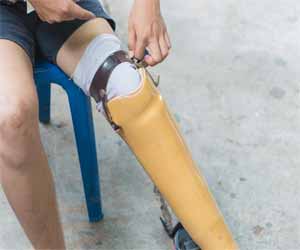- Home
- Editorial
- News
- Practice Guidelines
- Anesthesiology Guidelines
- Cancer Guidelines
- Cardiac Sciences Guidelines
- Critical Care Guidelines
- Dentistry Guidelines
- Dermatology Guidelines
- Diabetes and Endo Guidelines
- Diagnostics Guidelines
- ENT Guidelines
- Featured Practice Guidelines
- Gastroenterology Guidelines
- Geriatrics Guidelines
- Medicine Guidelines
- Nephrology Guidelines
- Neurosciences Guidelines
- Obs and Gynae Guidelines
- Ophthalmology Guidelines
- Orthopaedics Guidelines
- Paediatrics Guidelines
- Psychiatry Guidelines
- Pulmonology Guidelines
- Radiology Guidelines
- Surgery Guidelines
- Urology Guidelines
Low blood sugar episodes may lead to amputation in diabetic foot patients

Israel: Low blood sugar episodes or hypoglycemia events in patients hospitalized with acute diabetic foot may lead to amputation, according to a recent study.p
The findings, published in the Journal of Clinical Endocrinology and Metabolism, highlights the need for efforts to minimize in-hospital hypoglycemic events.
Diabetic foot infection (DFI) is the most common complication of diabetes mellitus leading to hospitalization and the most frequent cause of non-traumatic lower extremity amputation. It is defined as soft tissue and bone infection under malleoli. Most diabetic foot infections are polymicrobial and the most common pathogens in diabetic foot infection are aerobic gram-positive cocci, mainly Staphylococcus species.
For this retrospective cohort study, the researchers reviewed demographic, clinical, laboratory and point-of-care glucose data in patients hospitalized with acute diabetic foot in the diabetic foot unit during 2015-2017.
The primary outcomes were any or major amputation during hospitalization. Secondary outcomes included the length of hospitalization and in-hospital mortality.
Key results of the study include:
- 418 patients were hospitalized in the DF unit and 45,496 glucose measurements were taken.
- Patients experiencing any hyperglycemia and any or severe hypoglycemia were more likely to undergo any or major amputations during hospitalization.
- High glycemic variability was associated with major amputations.
- Peripheral vascular disease (PVD), high Wagner score and hypoglycemia were independent predictors of amputations.
- Older age, PVD, previous amputation, elevated WBC, high Wagner score and hypoglycemia were independent predictors of major amputations.
"Hypoglycemia in hospitalized patients is an independent risk factor for any and major amputation. Although it is still not clear whether low blood sugar directly leads to adverse outcomes or is simply a biomarker of the disease severity, efforts to minimize in-hospital hypoglycemic events are warranted," concluded the authors.
To read the complete study log on to https://doi.org/10.1210/jc.2019-00774

Disclaimer: This site is primarily intended for healthcare professionals. Any content/information on this website does not replace the advice of medical and/or health professionals and should not be construed as medical/diagnostic advice/endorsement or prescription. Use of this site is subject to our terms of use, privacy policy, advertisement policy. © 2020 Minerva Medical Treatment Pvt Ltd